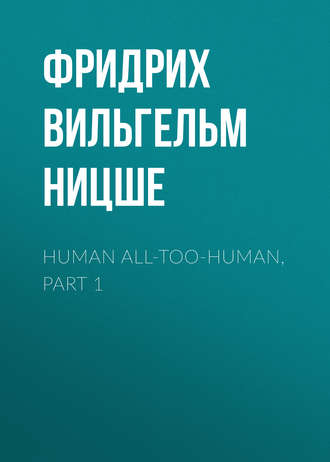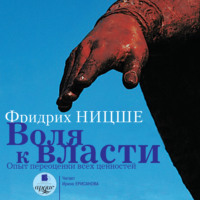 полная версия
полная версияHuman All-Too-Human, Part 1
The Wish to Arouse Pity. – In the most remarkable passage of his auto – portrait (first printed in 1658), La Rochefoucauld assuredly hits the nail on the head when he warns all sensible people against pity, when he advises them to leave that to those orders of the people who have need of passion (because it is not ruled by reason), and to reach the point of helping the suffering and acting energetically in an accident; while pity, according to his (and Plato's) judgment, weakens the soul. Certainly we should exhibit pity, but take good care not to feel it, for the unfortunate are so stupid that to them the exhibition of pity is the greatest good in the world. One can, perhaps, give a more forcible warning against this feeling of pity if one looks upon that need of the unfortunate not exactly as stupidity and lack of intellect, a kind of mental derangement which misfortune brings with it (and as such, indeed, La Rochefoucauld appears to regard it), but as something quite different and more serious. Observe children, who cry and scream in order to be pitied, and therefore wait for the moment when they will be noticed; live in intercourse with the sick and mentally oppressed, and ask yourself whether that ready complaining and whimpering, that making a show of misfortune, does not, at bottom, aim at making the spectators miserable; the pity which the spectators then exhibit is in so far a consolation for the weak and suffering in that the latter recognise therein that they possess still one power, in spite of their weakness, the power of giving pain. The unfortunate derives a sort of pleasure from this feeling of superiority, of which the exhibition of pity makes him conscious; his imagination is exalted, he is still powerful enough to give the world pain. Thus the thirst for pity is the thirst for self-gratification, and that, moreover, at the expense of his fellow-men; it shows man in the whole inconsiderateness of his own dear self, but not exactly in his "stupidity," as La Rochefoucauld thinks. In society-talk three-fourths of all questions asked and of all answers given are intended to cause the interlocutor a little pain; for this reason so many people pine for company; it enables them to feel their power. There is a powerful charm of life in such countless but very small doses in which malice makes itself felt, just as goodwill, spread in the same way throughout the world, is the ever-ready means of healing. But are there many honest people who will admit that it is pleasing to give pain? that one not infrequently amuses one's self – and amuses one's self very well – in causing mortifications to others, at least in thought, and firing off at them the grape-shot of petty malice? Most people are too dishonest, and a few are too good, to know anything of this pudendum these will always deny that Prosper Mérimée is right when he says, "Sachez aussi qu'il n'y a rien de plus commun que de faire le mal pour le plaisir de le faire."
51How Appearance Becomes Actuality. – The actor finally reaches such a point that even in the deepest sorrow he cannot cease from thinking about the impression made by his own person and the general scenic effect; for instance, even at the funeral of his child, he will weep over his own sorrow and its expression like one of his own audience. The hypocrite, who always plays one and the same part, ceases at last to be a hypocrite; for instance, priests, who as young men are generally conscious or unconscious hypocrites, become at last natural, and are then really without any affectation, just priests; or if the father does not succeed so far, perhaps the son does, who makes use of his father's progress and inherits his habits. If any one long and obstinately desires to appear something, he finds it difficult at last to be anything else. The profession of almost every individual, even of the artist, begins with hypocrisy, with an imitating from without, with a copying of the effective. He who always wears the mask of a friendly expression must eventually obtain a power over well-meaning dispositions without which the expression of friendliness is not to be compelled, – and finally, these, again, obtain a power over him, he is well-meaning.
52The Point of Honour in Deception. – In all great deceivers one thing is noteworthy, to which they owe their power. In the actual act of deception, with all their preparations, the dreadful voice, expression, and mien, in the midst of their effective scenery they are overcome by their belief in themselves it is this, then, which speaks so wonderfully and persuasively to the spectators. The founders of religions are distinguished from those great deceivers in that they never awake from their condition of self-deception; or at times, but very rarely, they have an enlightened moment when doubt overpowers them; they generally console themselves, however, by ascribing these enlightened moments to the influence of the Evil One. There must be self-deception in order that this and that may produce great effects. For men believe in the truth of everything that is visibly, strongly believed in.
53The Nominal Degrees of Truth. – One of the commonest mistakes is this: because some one is truthful and honest towards us, he must speak the truth. Thus the child believes in its parents' judgment, the Christian in the assertions of the Founder of the Church. In the same way men refuse to admit that all those things which men defended in former ages with the sacrifice of life and happiness were nothing but errors; it is even said, perhaps, that they were degrees of the truth. But what is really meant is that when a man has honestly believed in something, and has fought and died for his faith, it would really be too unjust if he had only been inspired by an error. Such a thing seems a contradiction of eternal justice; therefore the heart of sensitive man ever enunciates against his head the axiom: between moral action and intellectual insight there must absolutely be a necessary connection. It is unfortunately otherwise; for there is no eternal justice.
54Falsehood. – Why do people mostly speak the truth in daily life? – Assuredly not because a god has forbidden falsehood. But, firstly, because it is more convenient, as falsehood requires invention, deceit, and memory. (As Swift says, he who tells a lie is not sensible how great a task he undertakes; for in order to uphold one lie he must invent twenty others.) Therefore, because it is advantageous in upright circumstances to say straight out, "I want this, I have done that," and so on; because, in other words, the path of compulsion and authority is surer than that of cunning. But if a child has been brought up in complicated domestic circumstances, he employs falsehood, naturally and unconsciously says whatever best suits his interests; a sense of truth and a hatred of falsehood are quite foreign and unknown to him, and so he lies in all innocence.
55Throwing Suspicion on Morality For Faith's Sake. – No power can be maintained when it is only represented by hypocrites; no matter how many "worldly" elements the Catholic Church possesses, its strength lies in those still numerous priestly natures who render life hard and full of meaning for themselves, and whose glance and worn bodies speak of nocturnal vigils, hunger, burning prayers, and perhaps even of scourging; these move men and inspire them with fear. What if it were necessary to live thus? This is the terrible question which their aspect brings to the lips. Whilst they spread this doubt they always uprear another pillar of their power; even the free-thinker does not dare to withstand such unselfishness with hard words of truth, and to say, "Thyself deceived, deceive not others!" Only the difference of views divides them from him, certainly no difference of goodness or badness; but men generally treat unjustly that which they do not like. Thus we speak of the cunning and the infamous art of the Jesuits, but overlook the self-control which every individual Jesuit practises, and the fact that the lightened manner of life preached by Jesuit books is by no means for their benefit, but for that of the laity. We may even ask whether, with precisely similar tactics and organisation, we enlightened ones would make equally good tools, equally admirable through self-conquest, indefatigableness, and renunciation.
56Victory of Knowledge Over Radical Evil. – It is of great advantage to him who desires to be wise to have witnessed for a time the spectacle of a thoroughly evil and degenerate man; it is false, like the contrary spectacle, but for whole long periods it held the mastery, and its roots have even extended and ramified themselves to us and our world. In order to understand ourselves we must understand it but then, in order to mount higher we must rise above it. We recognise, then, that there exist no sins in the metaphysical sense; but, in the same sense, also no virtues; we recognise that the entire domain of ethical ideas is perpetually tottering, that there are higher and deeper conceptions of good and evil, of moral and immoral. He who does not desire much more from things than a knowledge of them easily makes peace with his soul, and will make a mistake (or commit a sin, as the world calls it) at the most from ignorance, but hardly from covetousness. He will no longer wish to excommunicate and exterminate desires; but his only, his wholly dominating ambition, to know as well as possible at all times, will make him cool and will soften all the savageness in his disposition. Moreover, he has been freed from a number of tormenting conceptions, he has no more feeling at the mention of the words "punishments of hell," "sinfulness," "incapacity for good," he recognises in them only the vanishing shadow-pictures of false views of the world and of life.
57Morality As the Self-disintegration of Man. – A good author, who really has his heart in his work, wishes that some one could come and annihilate him by representing the same thing in a clearer way and answering without more ado the problems therein proposed. The loving girl wishes she could prove the self-sacrificing faithfulness of her love by the unfaithfulness of her beloved. The soldier hopes to die on the field of battle for his victorious fatherland; for his loftiest desires triumph in the victory of his country. The mother gives to the child that of which she deprives herself – sleep, the best food, sometimes her health and fortune. But are all these un-egoistic conditions? Are these deeds of morality miracles, because, to use Schopenhauer's expression, they are "impossible and yet performed"? Is it not clear that in all four cases the individual loves something of himself, a thought, a desire, a production, better than anything else of himself; that he therefore divides his nature and to one part sacrifices all the rest? Is it something entirely different when an obstinate man says, "I would rather be shot than move a step out of my way for this man"? The desire for something (wish, inclination, longing) is present in all the instances mentioned; to give way to it, with all its consequences, is certainly not "un-egoistic." – In ethics man does not consider himself as Individuum but as dividuum.
58What One May Promise. – One may promise actions, but no sentiments, for these are involuntary. Whoever promises to love or hate a person, or be faithful to him for ever, promises something which is not within his power; he can certainly promise such actions as are usually the results of love, hate, or fidelity, but which may also spring from other motives; for many ways and motives lead to one and the same action. The promise to love some one for ever is, therefore, really: So long as I love you I will act towards you in a loving way; if I cease to love you, you will still receive the same treatment from me, although inspired by other motives, so that our fellow-men will still be deluded into the belief that our love is unchanged and ever the same. One promises, therefore, the continuation of the semblance of love, when, without self-deception, one speaks vows of eternal love.
59Intellect and Morality. – One must have a good memory to be able to keep a given promise. One must have a strong power of imagination to be able to feel pity. So closely is morality bound to the goodness of the intellect.
60TO WISH FOR REVENGE AND TO TAKE REVENGE. – To have a revengeful thought and to carry it into effect is to have a violent attack of fever, which passes off, however, – but to have a revengeful thought without the strength and courage to carry it out is a chronic disease, a poisoning of body and soul which we have to bear about with us. Morality, which only takes intentions into account, considers the two cases as equal; usually the former case is regarded as the worse (because of the evil consequences which may perhaps result from the deed of revenge). Both estimates are short-sighted.
61The Power of Waiting. – Waiting is so difficult that even great poets have not disdained to take incapability of waiting as the motive for their works. Thus Shakespeare in Othello or Sophocles in Ajax, to whom suicide, had he been able to let his feelings cool down for one day, would no longer have seemed necessary, as the oracle intimated; he would probably have snapped his fingers at the terrible whisperings of wounded vanity, and said to himself, "Who has not already, in my circumstances, mistaken a fool for a hero? Is it something so very extraordinary?" On the contrary, it is something very commonly human; Ajax might allow himself that consolation. Passion will not wait; the tragedy in the lives of great men frequently lies not in their conflict with the times and the baseness of their fellow-men, but in their incapacity of postponing their work for a year or two; they cannot wait. In all duels advising friends have one thing to decide, namely whether the parties concerned can still wait awhile; if this is not the case, then a duel is advisable, inasmuch as each of the two says, "Either I continue to live and that other man must die immediately, or vice versa." In such case waiting would mean a prolonged suffering of the terrible martyrdom of wounded honour in the face of the insulter, and this may entail more suffering than life is worth.
62Revelling in Vengeance. – Coarser individuals who feel themselves insulted, make out the insult to be as great as possible, and relate the affair in greatly exaggerated language, in order to be able to revel thoroughly in the rarely awakened feelings of hatred and revenge.
63The Value of Disparagement. – In order to maintain their self-respect in their own eyes and a certain thoroughness of action, not a few men, perhaps even the majority, find it absolutely necessary to run down and disparage all their acquaintances. But as mean natures are numerous, and since it is very important whether they possess that thoroughness or lose it, hence —
64The Man in a Passion. – We must beware of one who is in a passion against us as of one who has once sought our life; for the fact that we still live is due to the absence of power to kill, – if looks would suffice, we should have been dead long ago. It is a piece of rough civilisation to force some one into silence by the exhibition of physical savageness and the inspiring of fear. That cold glance which exalted persons employ towards their servants is also a relic of that caste division between man and man, a piece of rough antiquity; women, the preservers of ancient things, have also faithfully retained this survival of an ancient habit.
65Whither Honesty Can Lead. – Somebody had the bad habit of occasionally talking quite frankly about the motives of his actions, which were as good and as bad as the motives of most men. He first gave offence, then aroused suspicion, was then gradually excluded from society and declared a social outlaw, until at last justice remembered such an abandoned creature, on occasions when it would otherwise have had no eyes, or would have closed them. The lack of power to hold his tongue concerning the common secret, and the irresponsible tendency to see what no one wishes to see – himself – brought him to a prison and an early death.
66Punishable, But Never Punished. – Our crime against criminals lies in the fact that we treat them like rascals.
67Sancta Simplicitas OF VIRTUE. – Every virtue has its privileges; for example, that of contributing its own little faggot to the scaffold of every condemned man.
68Morality and Consequences. – It is not only the spectators of a deed who frequently judge of its morality or immorality according to its consequences, but the doer of the deed himself does so. For the motives and intentions are seldom sufficiently clear and simple, and sometimes memory itself seems clouded by the consequences of the deed, so that one ascribes the deed to false motives or looks upon unessential motives as essential. Success often gives an action the whole honest glamour of a good conscience; failure casts the shadow of remorse over the most estimable deed. Hence arises the well-known practice of the politician, who thinks, "Only grant me success, with that I bring all honest souls over to my side and make myself honest in my own eyes." In the same way success must replace a better argument. Many educated people still believe that the triumph of Christianity over Greek philosophy is a proof of the greater truthfulness of the former, – although in this case it is only the coarser and more powerful that has triumphed over the more spiritual and delicate. Which possesses the greater truth may be seen from the fact that the awakening sciences have agreed with Epicurus' philosophy on point after point, but on point after point have rejected Christianity.
69Love and Justice. – Why do we over-estimate love to the disadvantage of justice, and say the most beautiful things about it, as if it were something very much higher than the latter? Is it not visibly more stupid than justice? Certainly, but precisely for that reason all the pleasanter for every one. It is blind, and possesses an abundant cornucopia, out of which it distributes its gifts to all, even if they do not deserve them, even if they express no thanks for them. It is as impartial as the rain, which, according to the Bible and experience, makes not only the unjust, but also occasionally the just wet through to the skin.
70Execution. – How is it that every execution offends us more than does a murder? It is the coldness of the judges, the painful preparations, the conviction that a human being is here being used as a warning to scare others. For the guilt is not punished, even if it existed – it lies with educators, parents, surroundings, in ourselves, not in the murderer – I mean the determining circumstances.
71Hope. – Pandora brought the box of ills and opened it. It was the gift of the gods to men, outwardly a beautiful and seductive gift, and called the Casket of Happiness. Out of it flew all the evils, living winged creatures, thence they now circulate and do men injury day and night. One single evil had not yet escaped from the box, and by the will of Zeus Pandora closed the lid and it remained within. Now for ever man has the casket of happiness in his house and thinks he holds a great treasure; it is at his disposal, he stretches out his hand for it whenever he desires; for he does not know the box which Pandora brought was the casket of evil, and he believes the ill which remains within to be the greatest blessing, – it is hope. Zeus did not wish man, however much he might be tormented by the other evils, to fling away his life, but to go on letting himself be tormented again and again. Therefore he gives man hope, – in reality it is the worst of all evils, because it prolongs the torments of man.
72The Degree of Moral Inflammability Unknown. – According to whether we have or have not had certain disturbing views and impressions – for instance, an unjustly executed, killed, or martered father; a faithless wife; a cruel hostile attack – it depends whether our passions reach fever heat and influence our whole life or not. No one knows to what he may be driven by circumstances, pity, or indignation; he does not know the degree of his own inflammability. Miserable little circumstances make us miserable; it is generally not the quantity of experiences, but their quality, on which lower and higher man depends, in good and evil.
73The Martyr in Spite of Himself. – There was a man belonging to a party who was too nervous and cowardly ever to contradict his comrades; they made use of him for everything, they demanded everything from him, because he was more afraid of the bad opinion of his companions than of death itself; his was a miserable, feeble soul. They recognised this, and on the ground of these qualities they made a hero of him, and finally even a martyr. Although the coward inwardly always said No, with his lips he always said Yes, even on the scaffold, when he was about to die for the opinions of his party; for beside him stood one of his old companions, who so tyrannised over him by word and look that he really suffered death in the most respectable manner, and has ever since been celebrated as a martyr and a great character.
74I the Every-day Standard. – One will seldom go wrong if one attributes extreme actions to vanity, average ones to habit, and petty ones to fear.
75Misunderstanding Concerning Virtue. – Whoever has known immorality in connection with pleasure, as is the case with a man who has a pleasure-seeking youth behind him, imagines that virtue must be connected with absence of pleasure. – Whoever, on the contrary, has been much plagued by his passions and vices, longs to find in virtue peace and the soul's happiness. Hence it is possible for two virtuous persons not to understand each other at all.
76The Ascetic. – The ascetic makes a necessity of virtue.
77Transferring Honour from the Person to the Thing. – Deeds of love and sacrifice for the benefit of one's neighbour are generally honoured, wherever they are manifested. Thereby we multiply the valuation of things which are thus loved, or for which we sacrifice ourselves, although perhaps they are not worth much in themselves. A brave army is convinced of the cause for which it fights.
78Ambition a Substitute For the Moral Sense. – The moral sense must not be lacking in those natures which have no ambition. The ambitious manage without it, with almost the same results. For this reason the sons of unpretentious, unambitious families, when once they lose the moral sense, generally degenerate very quickly into complete scamps.
79Vanity Enriches. – How poor would be the human mind without vanity! Thus, however, it resembles a well-stocked and constantly replenished bazaar which attracts buyers of every kind. There they can find almost everything, obtain almost everything, provided that they bring the right sort of coin, namely admiration.
80Old Age and Death. – Apart from the commands of religion, the question may well be asked, Why is it more worthy for an old man who feels his powers decline, to await his slow exhaustion and extinction than with full consciousness to set a limit to his life? Suicide in this case is a perfectly natural, obvious action, which should justly arouse respect as a triumph of reason, and did arouse it in those times when the heads of Greek philosophy and the sturdiest patriots used to seek death through suicide. The seeking, on the contrary, to prolong existence from day to day, with anxious consultation of doctors and painful mode of living, without the power of drawing nearer to the actual aim of life, is far less worthy. Religion is rich in excuses to reply to the demand for suicide, and thus it ingratiates itself with those who wish to cling to life.
81Errors of the Sufferer and the Doer. – When a rich man deprives a poor man of a possession (for instance, a prince taking the sweetheart of a plebeian), an error arises in the mind of the poor man; he thinks that the rich man must be utterly infamous to take away from him the little that he has. But the rich man does not estimate so highly the value of a single possession, because he is accustomed to have many; hence he cannot imagine himself in the poor man's place, and does not commit nearly so great a wrong as the latter supposes. They each have a mistaken idea of the other. The injustice of the powerful, which, more than anything else, rouses indignation in history, is by no means so great as it appears. Alone the mere inherited consciousness of being a higher creation, with higher claims, produces a cold temperament, and leaves the conscience quiet; we all of us feel no injustice when the difference is very great between ourselves and another creature, and kill a fly, for instance, without any pricks of conscience. Therefore it was no sign of badness in Xerxes (whom even all Greeks describe as superlatively noble) when he took a son away from his father and had him cut in pieces, because he had expressed a nervous, ominous distrust of the whole campaign; in this case the individual is put out of the way like an unpleasant insect; he is too lowly to be allowed any longer to cause annoyance to a ruler of the world. Yes, every cruel man is not so cruel as the ill-treated one imagines the idea of pain is not the same as its endurance. It is the same thing in the case of unjust judges, of the journalist who leads public opinion astray by small dishonesties. In all these cases cause and effect are surrounded by entirely different groups of feelings and thoughts; yet one unconsciously takes it for granted that doer and sufferer think and feel alike, and according to this supposition we measure the guilt of the one by the pain of the other.









